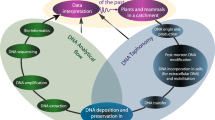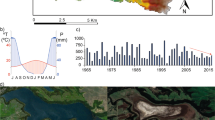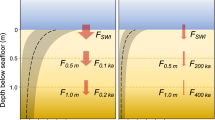Abstract
An historical record of natural (pre-cultural) and anthropogenic (influenced by man's activities) chemical inputs to the environment is contained in accumulating sediment deposits and is commonly expressed as a depositional flux1. This flux is traditionally calculated as the product of the sediment accumulation rate and the concentration of a substance in the sediment1. Previous work has quantified depositional fluxes of metals and nutrients by assuming that the vertical distribution of these substances in sediments is unaffected by post-depositional migration, chemical reaction or porosity variations2–10. We present here a procedure for calculating the historical depositional flux (loading record) of a substance which undergoes post-depositional chemical reaction in a compacting sediment column. The method is demonstrated by calculating the loading record of organic nitrogen at one locality in Lake Erie.
This is a preview of subscription content, access via your institution
Access options
Subscribe to this journal
Receive 51 print issues and online access
$199.00 per year
only $3.90 per issue
Buy this article
- Purchase on Springer Link
- Instant access to full article PDF
Prices may be subject to local taxes which are calculated during checkout
Similar content being viewed by others
References
Bruland, K. W., Bertine, K., Koide, M. & Goldberg, E. D. Envir. Sci. Technol. 8, 425–432 (1974).
Thompson, J., Turekian, K. K. & McCaffrey, R. J. in Estuarine Research (ed. Cronin, E. L.) 28 (Academic, New York, 1975).
Edgington, D. N. & Robbins, J. A. Envir. Sci. Technol. 10, 266–274 (1976).
Goldberg, E. D., Hodge, V., Koide, M. & Griffin, J. J. Geochem. J. 10, 165–174 (1976).
Kemp, A. L. W., Thomas, R. L., Dell, C. I. & Jaquet, J. M. J. Fish. Res. Bd Can. 33, 440–462 (1976).
Williams, J. D. H., Murphy, T. P. & Mayer, T. J. Fish. Res. Bd Can. 33, 430–439 (1976).
Goldberg, E. D., Gamble, E., Griffin, J. J. & Koide, M. Estuar. Coastal mar. Sci. 5, 549–561 (1977).
Goldberg, E. D. et al. Geochim. cosmochim. Acta 42, 1413–1425 (1978).
Nriagu, J. O., Kemp, A. L. W., Wong, H. K. T. & Harper, N. Geochim. cosmochim. Acta 43, 247–258 (1980).
Lasaga, A. C. & Holland, H. D. Geochim. cosmochim. Acta 40, 257–266 (1976).
Rosenfeld, J. K. thesis, Yale Univ. (1977).
Berner, R. A. in The Sea Vol. 5 (ed. Goldberg, E. D.) 427–450 (Wiley, New York, 1974).
Matisoff, G., Fisher, J. B. & McCall, P. L. Geochim. cosmochim. Acta 45, 2333–2347 (1981).
Rosenfeld, J. K. Limnol. Oceanogr. 24, 356–364 (1979).
Sly, P. G. J. Fish. Res. Bd Can. 33, 355–370 (1976).
Author information
Authors and Affiliations
Rights and permissions
About this article
Cite this article
Fisher, J., Matisoff, G. & Lick, W. Downcore variation in sediment organic nitrogen. Nature 296, 345–347 (1982). https://doi.org/10.1038/296345a0
Received:
Accepted:
Published:
Issue Date:
DOI: https://doi.org/10.1038/296345a0
This article is cited by
-
Historical loading record of sulfur in an Adirondack Lake
Journal of Paleolimnology (1993)
Comments
By submitting a comment you agree to abide by our Terms and Community Guidelines. If you find something abusive or that does not comply with our terms or guidelines please flag it as inappropriate.



